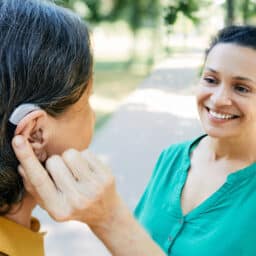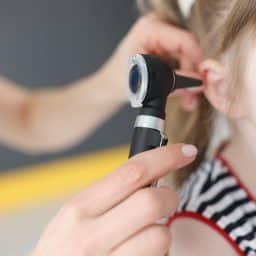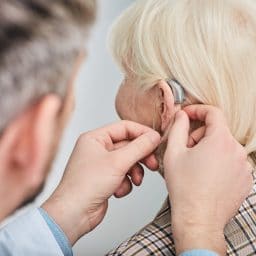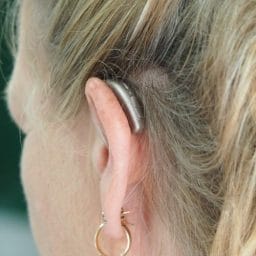Surprising Features of Hearing Aids

If you’re resistant to wearing hearing aids, it may be because you picture the bulky, clunky devices your parents or grandparents wore. Today’s hearing aids are nothing like their predecessors – they’re sleek and discreet, and most boast amazing features that may surprise you. We review some surprising features of hearing aids below. Minimal Occlusion…
Tips for Navigating Social Situations as a New Hearing Aid User

Hearing aids can greatly improve your ability to navigate social situations, from neighborhood potlucks to a night out with friends at Carmine’s Steak House. However, just because they make it easier to follow conversations doesn’t mean that hearing aids don’t take a bit of time to get used to. Let’s examine a few of the…
Essential Daily Habits for New Hearing Aid Users

Are you new to hearing aids and feeling a bit overwhelmed? If so, don’t worry. You are not alone. Hearing aids can take a bit of time to get used to. However, by incorporating the following daily habits into your life, you are much more likely to enjoy your best listening experience. Be Consistent About…
What are the differences between hearing aids and cochlear implants?

Hearing loss is common, affecting approximately 48 million Americans. Fortunately, people with this condition have several treatment options. Two treatments for sensorineural hearing loss – a type of hearing loss caused by damage to the sensory cells in the inner ear – include hearing aids and cochlear implants. We review the differences between these two…
Are Children with Hearing Loss More Likely to Experience Behavioral Difficulties?

There’s not a child on earth who doesn’t sometimes experience behavioral difficulties. However, some populations might be especially prone to these types of struggles. In fact, research shows that children with hearing loss are more likely to experience behavioral difficulties than children without. We review what the studies show below. What the Study Shows A…
Tips for the Trail: How to Hike with Hearing Aids
There are many benefits to hitting Mississippi Greenway with friends and family. According to one study published in the American Journal of Lifestyle Medicine in 2018, “Benefits [of hiking] may be immediate, such as decreased blood pressure, decreased stress levels, enhanced immune system functioning, and restored attention, or transpire over time, such as weight loss,…
Do Your Hearing Aids Need Adjusting?

Hearing aids can dramatically improve your ability to process sounds as well as your overall quality of life. However, to get the most out of your device, you will need to have a regular maintenance routine that includes adjustments from your provider. Common Reasons You Might Need a Hearing Aid Tune-Up Your hearing aid feels…
How Does Hearing Loss Impact Learning in Young People?

Untreated hearing loss can have major effects on a child’s development, learning and social life. Because of this, it’s important to recognize the signs and seek interventions and accommodations early. Below we review the effects of hearing loss on learning in children as well as what teachers can do to accommodate their students with hearing…
What is The Connection Between Neuroplasticity and Hearing Loss Treatment?

Neuroplasticity refers to your brain’s ability to form new neural connections in response to change. This adaptability may be useful when it comes to reversing changes in the brain caused by hearing loss. How Hearing Loss Can Change Your Brain If hearing loss is left untreated, it may alter the structure and function of your…
Can Hearing Aids Help with Balance Issues?

Do you have hearing loss and also experience balance problems when hiking in Kennedy Forest? If so, you’re not alone. It’s common for people with hearing loss to also experience balance problems due to the fact that the auditory and vestibular systems are both housed in the inner ear; if one system is damaged, it’s…